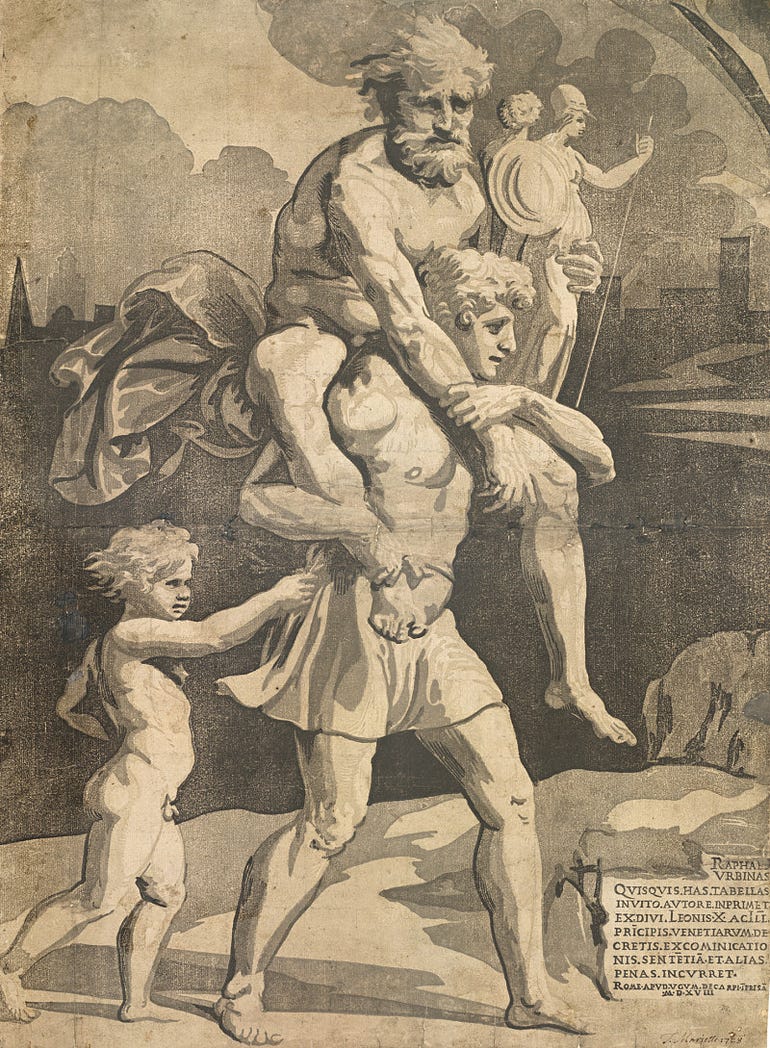Into the Thickst: Welcome to In Medias Res
The first real cold spell has settled on New York City now: just walking around the city today, I was reminded of all the things this season brings. It’s dark before you leave work, but there are lights in all the shop windows; New Yorkers are sporting their winter finery, and a party means a mountain of coats somewhere near the door. Gusts of wind race down the hard streets, and pedestrians damn the weather as they turn windy corners. But the indoor pleasures are all the more pleasurable: now is the time to find out what’s playing at the concert hall, discover some treasure tucked in an obscure gallery, catch up with an old friend, read something worth reading, and dream of distant places.
In the spirit of all that, we offer you In Medias Res, Paideia’s new online journal of Classics and culture. You may know Paideia as an organization which tries to get people who love culture out of their homes and out into the world: bringing Latin back to the Latin Quarter of Paris, bringing the words of Cicero into the Roman Forum, reading ancient Greek by the wine-dark Mediterranean. But Paideia has also been busy with a host of digital humanities projects designed to bring culture into our homes and onto our phones. This journal is one of them. We will have updates about other projects here in this journal, which we hope will become a kind of online home for alumni of the Paideia Institute, and for lovers of the Classics and culture in general.
In that spirit we offer you, here at our outset, to honor the season in various ways: Tyler Dobbs’ Christmas meditation on Trajan, his column, and the statue of St. Peter that now sits atop it; Nancy Llewellyn’s glorious rendition of Hava Nagila into Latin; and Amy Garland’s intrepid expedition into Cinecitta’s 1959 sword-and-sandal epic Hannibal. And that’s just a little taste of the very many things we hope to be doing here. Which brings up the question — what precisely are we intending to do here? For that we need to step back a bit.
Nec reditum Diomedis ab interitu Meleagri,
nec gemino bellum Troianum orditur ab ovo;
semper ad eventum festinat et in medias res
non secus ac notas auditorem rapit, et quae
desperat tractata nitescere posse relinquit.
Horace’s above description of the Homeric style may well be the most famous description of good writing ever penned. For those whose Latin is a bit rusty, the first published English translation, by Thomas Drant in 1566, is rather free but provides a sense of it:
For writing of the Trioane warr and Greekes fayre buskinde leggs,
He [Homer] doth not fetche his matter downe from Ladye Ledaes eggs,
He hasteth on unto the happes, the hearer hee doth drawe
Into the thickst, & lets him tast, as he the whole did know.
In passing I will point out that Drant is making up the part about the Greeks’ “fair buskined legs” (quite charmingly so), but right now my focus is on the famous phrase in medias res (“into the thickst”). Why call our journal In Medias Res? By connotation it reminds us to deal with facts and affairs of this world (res) as opposed to theory and abstraction; it has overtones of a middle ground, which, as a journal, we wish to occupy; and in its context it speaks of vigorous writing that “hasteth unto the happes” and grabs the reader’s attention — the kind of writing we wish to see (information for submitting to In Medias Res can be found here). And we choose the title because ultimately we believe that our work as students and teachers has thrown us all in medias res,that middle ground between the past and the future, where we learn as students and share as teachers. The classic image of it is Aeneas carrying his father — the past, the tradition — and leading his son — the future. We are immersed, from one end of our life to another, in paideia, in the ancient Greek sense: the age-old, never-ending work of the transmission of culture. Into the thickst, then.

Ugo da Carpi (after Raphael), “Aeneas, Anchises, and Ascanius,” 1518.
Sign up to receive email updates about new articles


Comment
Sign in with